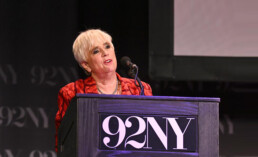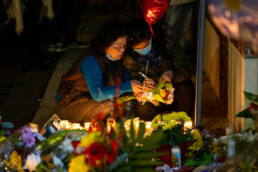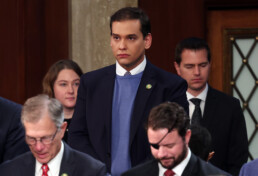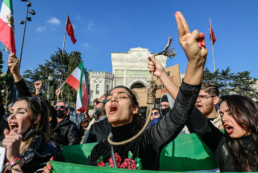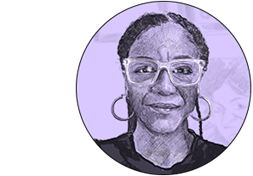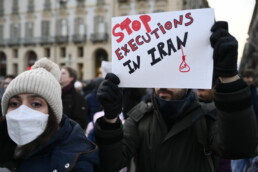27 Years After the Vagina Monologues
Uncategorized
The writer V—formerly Eve Ensler—on what’s changed for her and the world.
BY CINDI LEIVE
February 3, 2023
It’s been a quarter century since the performer Eve Ensler—who now goes by V—created the culture-changing play The Vagina Monologues and, shortly thereafter, the anti-violence organization V-Day. Times have changed—we now have more inclusive definitions of gender—but V’s gift as a writer has not. Her new book, Reckoning, touches on many topics but cuts deepest when it chronicles her decades-long recovery from childhood abuse.
Actually, let me restate because, after talking to V, I’m disinclined to use clichés: her decades-long recovery from her father raping her and her mother protecting him. And as you’ll hear, that specificity matters.
CL: You’ve been writing about violence for four decades. We’re more willing to have these discussions now. But how are you feeling about these issues in 2023?
V: We’ve had amazing victories. We’ve broken taboos. We’ve opened safe houses, we’ve changed laws, we’ve activated young people. A lot of wonderful things happened. But the essential problem is we have patriarchy. We can have one-off wins, but we’re still in that system where very, very, very few, usually men, have all the wealth, all the power, all the ability to determine who is valuable, who is worthy, who gets to live, who gets to die, who has money, who doesn’t, and that all the rest need to be controlled or gotten rid of. Are we going to stay like that? Or are we going to say—finally at last—we don’t accept this way of operating? Because otherwise we will be in this struggle for eternity.
Cindi Leive: One of the things that has always affected me about your writing—going back to when I first saw The Vagina Monologues in the mid-90s—is how specific you always are in your language. You write in Reckoning that “violence against women” has become too abstract and broad a term. What do you mean by that?
V: I’ve always been despondent over the terms that we keep using for violence against women. They just seem to get more and more distant, more and more abstract, as the violence seems to get more and more amplified and horrific. And I don’t think that’s accidental.
When we talk about “gender-based violence,” who’s doing the violence? What is exactly being done, and who’s it being done to? The confusion of that takes the responsibility off the perpetrator. It really should be “men committing violence against women.” I mean, not all violence against women is by men, but a great deal of it is. And when you say “rape,” it’s very different than when you say “gender-based violence.” One you have an image of, and can see. With “gender-based violence,” I have no vision of what that is.
In writing The Apology [V’s 2019 book in which she imagines her father apologizing to her], it was very clear to me that there is no apology without a rendering of the specific details of what you have done. Because in that specificity, both you—the victim—and the perpetrator know you were present at the same event. If you say “I’m sorry I abused you,” that’s not an indication that you were there. But if you say “I’m sorry I walked into your room that had the gingham sheets and the pink bedspread” then you both know you were in the same room, and you’re accountable to the same moment.
CL: In the book, speaking of your own experience, you write, “this abuse altered the constitutional makeup of my entire being. It filled my cells and blood and body with terror, worry, guilt, and dread—that would in my teenage years and on until my sixties develop into all-encompassing self-hatred and anxiety.” That’s a really devastating sentence. But it also made me a little bit hopeful because you say “until my sixties,” which implies that you have perhaps found some peace.
V: One of the things about the kind of violence that happens to women is that no one really wants to think about long-term consequences. We talk about it as if it’s a one-off event when in fact it radically alters a woman’s life forever, right? I don’t know any woman who was abused sexually as a child or a young woman who has not had huge intimacy issues, particularly if they were incested by a family member. Nobody talks about what it does to your memory or your ability to think or your willingness and ability to be a leader, because then you’re seen and then you become a target and then you could be raped again.
I’ve had to do a lot of work to escape, and by no means am I fully out of it. There are things that can trigger me and put me back into it. But since I wrote The Apology, I will say I’m in a very different place. I felt I was forever in my father’s story, and that has changed. Yes, I got very damaged and broken early on…but it’s not the sum of me, it’s not the total of me. And that’s amazing. I never thought that I would ever see that.

Cindi Leive is the co-founder of The Meteor, the former editor-in-chief of Glamour and Self, and the author or producer of best-selling books including Together We Rise.
What Does the Brett Kavanaugh Documentary Do For Us?
|
Buona sera Meteor readers, This send is somewhat bittersweet. Sweet because it’s, as usual, chock full of interesting stories you may or may not have heard about, like the new slate of anti-LGBTQ bills in Indiana, the latest on Brittney Griner, and a look at the Brett Kavanaugh documentary Justice which premiered at Sundance last week. But it’s bitter because it is also the last newsletter I’ll be writing for quite some time—because I am having a baby 🐣. It’s been an absolute joy and privilege to be a part of all 105 Meteor newsletters so far (who’s counting, me, I’m counting). We’ve written through fun times and through absolute horror, and with each send our community has grown, and so have I. But, alas, it’s time for me to prep for my biggest project of all: parenthood. My firstborn is due to arrive soon and while I’d love to hang out here with all of you, my fingers have swollen to the size of stuffed Vienna sausages, and it’s time to hand the keyboard over to someone else for a bit. So I really hope you enjoy this one. My daughter and I will see you all on the other side. 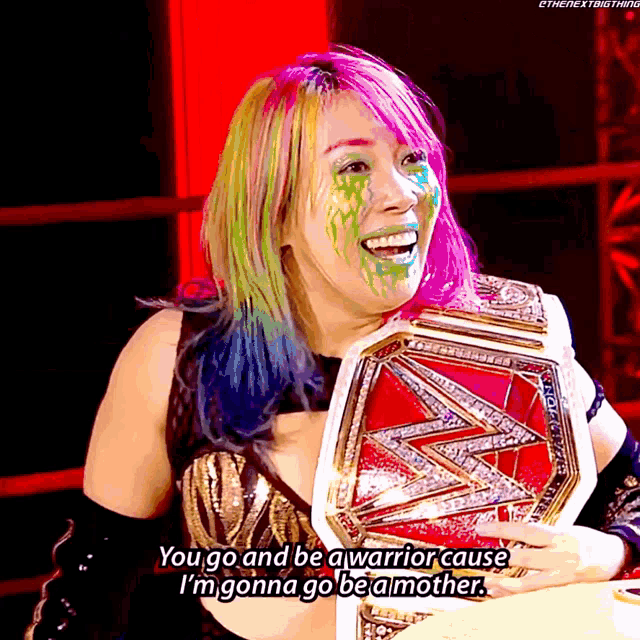 Marie Kondo-ing my baby’s drawers, Shannon Melero  WHAT'S GOING ON“Slate of hate”: Indiana is imitating Florida with a new batch of bills aimed at making the lives of school-aged LGBTQ children absolutely miserable. In total, there are three bills, including one in the Indiana House and one in its Senate, which both move to outlaw the mention of “gender fluidity; gender roles; gender stereotypes; gender identity; gender expression; or sexual orientation,” in grades K-12 in the classroom, among other things. And while these bills are frightening and intrusive—and would, by the way, keep all children from learning about gender—the third bill manages to one-up them both: LGBTQ news outlet them reports that SB 354 would “require schools to notify parents if a student ‘has conflicted feelings’ about gender identity, or if they change their name, attire, or pronoun ‘in a manner that is inconsistent with the student’s biological sex at birth’.” Let’s call this what it is: mandatory outing. Indiana lawmakers think it’s a good idea for teachers to start outing kids to their parents—without any knowledge of how those parents will react. And to what end, other than to put students at risk? I’m seriously asking. Class is canceled: Yesterday, students walked out of John Comaroff’s class at Harvard due to the school’s handling of Comaroff’s alleged sexual misconduct. (He had been accused of groping and harassing three graduate students last year.) One student read from a statement that said, in part, “We don’t want to be taught by someone who has still not been held accountable for or made amends for their sexual misconduct. If you agree, please join us in walking out of this classroom.” (At least 100 people did.) According to the Harvard Crimson, Comaroff was placed on leave last year after violating the university’s sexual harassment policy. (An internal investigation found that the accusations made against him were plausible, but no criminal charges were brought, and he is still tenured at Harvard.) For Harvard alum and our Meteor colleague Tara Abrahams, this was simply history repeating itself. Exactly 25 years ago this spring, Abrahams, then a junior at the school, wrote in Harvard Magazine about a similar situation in which “Harvard had not explicitly condemned sexual harassment and inappropriate conduct through real action, but had privately admonished a guilty faculty member.” After seeing all of those students take a stand against Comaroff and the institution’s decision to allow him to keep teaching, Abrahams told me, “I wish that the bravery of the students I spoke to more than 20 years ago had counted for more, that their speaking out would have meant that these young people would be able to experience a different Harvard today…And maybe I even feel a tiny glimmer of hope—that because of these kids standing up, one day, enough really will be enough.” AND:

 THE METEOR AT SUNDANCEDoes Justice Serve Justice? BOSS BABY BIG MAD! (IMAGE BY WIN McNAMEE VIA GETTY IMAGES) This past weekend, at the Sundance film festival, I caught the surprise feature Justice—a documentary about the allegations which surfaced against Brett Kavanaugh before his Supreme Court confirmation. The movie picks up where the botched FBI investigation ended—you know, the one that reportedly generated 4500 tips that the Trump White House ignored. The film doesn’t reveal anything particularly new—but it will absolutely resurface your rage. Justice does add context to what we already know, especially through a rigorous deep dive into fellow Yale student Deborah Ramirez’s allegations that Kavanaugh exposed himself to her at a party while they were undergraduates. According to the documentary, the FBI talked to Ramirez when they re-opened the investigation after Dr. Christine Blasey Ford’s testimony, but allegedly failed to follow up with any of the witnesses Ramirez’s team provided. Instead, they turned her testimony over to the Senate Judiciary Committee but Ramirez was never called to testify. The most damning bit of the movie is audio of Max Stier, one of Kavanaugh’s classmates at Yale and now the CEO of the nonpartisan DC group Partnership for Public Service. In the recording, which Stier allegedly submitted to the FBI in the days after Dr. Ford’s testimony as well, he both corroborates Ramirez’s account of what happened and describes another incident he witnessed. In the audio, Stier says that he was in a room where Kavanaugh was drunk and had his pants down, with a group of fellow students trying to force a young woman to touch his penis. As journalists Robin Pogrebin and Kate Kelly reported in their 2019 book, The Education of Brett Kavanaugh: An Investigation, the FBI did not follow up on Stier’s allegations. Kavanaugh was confirmed without the public hearing them. But hearing them out loud now is gutting. Stier himself did not speak to the filmmakers, and similarly, the movie is haunted by the absence of Dr. Ford, who is seen briefly at the beginning, and in clips throughout. (Director Doug Liman says it’s because she’s given enough to the country already; no argument there. As she told the Meteor in 2021, the months and years since the hearings have been brutal.) The movie is a stark portrait of one of the darkest moments in the history of American democracy, and it’s hard not to walk out retriggered, especially with the four years we’ve experienced since Dr. Ford’s gutting testimony. But in 2023, anger doesn’t feel like enough. Justice doesn’t get us much closer to accountability for the survivors—or change the reality that a sitting Supreme Court justice most likely perjured himself. Hopefully, this documentary is the beginning of a process—not just of rage but of actual, what’s the word, justice. But that’s unlikely. -Samhita Mukhopdhyay  FOLLOW THE METEOR Thank you for reading The Meteor! Got this from a friend? Sign up for your own copy, sent Tuesdays and Thursdays. Ideas? Feedback? Requests? Tell us what you think at [email protected]
|
![]()
Is This Normal?
|
Good evening Meteor readers, Last night, along with a million other folks across the country, I settled into the couch for three hours of appointment television. Yes, I’m talking about the 30th anniversary of Monday Night RAW, the longest-running weekly episodic television show in American history. Oh, were you watching something else? The evening was a celebration of not just the longevity of the show itself—which, for the uninitiated, is the premiere weekly wrestling program in the U.S —but of its iconic characters, some inexplicably still active in the wrestling world: Triple H, the Undertaker, Sean Michaels, etc. (I’d love to tack a woman onto that list, but alas, it seems that some invites got lost in the mail. Honorable mention to Alundra Blayze who was on screen for 15 seconds.)  TRISH STRATUS WATCHING THE SHOW FROM HOME AND SEEING NOT A SINGLE LEGENDARY WOMAN IN ATTENDANCE. As a lifelong on-and-off wrestling fan (the early-Divas era was hard for some of us), all that nostalgia made me reflect on how much and how little can change in 30 years. Since its inception, RAW has gone from a kitschy, wildly sexist male-driven soap opera to a multi-million dollar enterprise that can sometimes recognize its own sexism and even address it. Meanwhile, some institutions seem to make no progress at all. And as the headlines reminded us this weekend, over the last 30 years, America has managed, slowly but surely, to normalize the occurrence of mass shootings. A different day, a different set of victims, and the same response: thoughts, prayers, “never agains,” empty political gestures. Rinse, repeat. Without a breather. In today’s newsletter, we attempt to make sense of another tragedy and search for a few bright spots in the world. Surreptitiously convincing you to watch wrestling, Shannon Melero  WHAT'S GOING ONA weekend of mass shootings: There have been 39 mass shootings in the month of January, and the one that took place in California yesterday afternoon is the second the state has seen in three days. Before that shooting in Half Moon Bay, where seven were killed and one left in critical condition, there was the shooting in Monterey Park, which claimed 11 lives. And then, on Monday night, there was another shooting in Oakland, with one killed and seven injured. As one assemblyman in California told the Washington Post, “Before we’ve even had a chance to mourn them, there is yet another mass shooting.” The weight of that statement is bone-crushing. Police still have not determined a motive for either the Monterey Park or Half Moon Bay shootings, the former of which took place while the local community was celebrating the Lunar New Year. The suspected Monterey gunman reportedly died from a self-inflicted gunshot shortly after the incident. Meanwhile, the Half Moon Bay shooter was taken into police custody after he was found parked outside a precinct. No one has been apprehended in connection to the Oakland shooting. In response to this horrific string of events, President Biden called on Congress to reinstate the assault weapons ban, which you may recall expired in 2004. But we’ve seen this song and dance before, and the legislative process required to end (or even put a dent in) gun violence would require massive changes, like Republicans unclasping the death grasp they have on the second amendment. Ironically this brings to mind part of a motivational speech from Peloton instructor Jess Sims where she notes that people sometimes confuse the word hard with the word impossible. Solving gun violence is not impossible; it’s just extremely fucking hard. But hard things get accomplished all the time. *Looks at every other country on the globe that doesn’t have this problem* If you or someone you know has been impacted by gun violence and is looking for help, please start here. If you are a member of the AAPI community and are looking for mental health resources, try here. And if you’d like to take part in ending gun violence, here are some suggestions from the Prevention Institute. “Nothing to celebrate”: Renee Chelian was 15 years old when she found out she was pregnant. Although it was illegal at the time—1966—her parents asked her if she wanted to have an abortion. She said yes. Chelian is now an abortion provider in her home state of Michigan, and because of that initial traumatic experience, she has helped thousands of patients receive safe abortion care. On what should have been the 50th anniversary of Roe v. Wade, Chelian felt there was “nothing to celebrate.” But we celebrate her and the heroes, known and unknown, who work against all odds to provide necessary healthcare to pregnant people. AND:

 METEOR IRLHave you gotten your tickets for our live event yet? No? It's next week!! Click the image below to get the goods.  FOLLOW THE METEOR Thank you for reading The Meteor! Got this from a friend? Sign up for your own copy, sent Tuesdays and Thursdays. Ideas? Feedback? Requests? Tell us what you think at [email protected]
|
![]()
Literally, Who Is George Santos?
|
Blessed eve to you, Meteor readers, Today I’m thinking about New Zealand Prime Minister Jacinda Ardern, who announced that she would resign before her country’s next election. And she’s not doing it because of scandal or because she thinks she can’t win another election. (Shit, I’d vote for her if I could.) She’s doing it because, as she said, there just isn’t enough in her tank to do the job to the level of excellence she’s previously provided.  This really struck me. I’m so accustomed to American culture, where you work and do a job until it absolutely hobbles you, and then, in your depleted state, you do a little more. Imagine being so in tune with yourself and caring for your country so much that you can put your ego to the side and make a selfless decision like that. The zipping sound you hear is my suitcase closing as I head to catch a flight to NZ to ask Jacinda Ardern to be my new mentor. But before I board, we’ve got a great newsletter for you today with a look into the many lived lives of George Santos and a special announcement waiting for you down unda’. Evaluating all tank levels, Shannon Melero  WHAT'S GOING ONGeorgie boy: Where do we even begin? If you haven’t been following the walking VEEP episode that is the George Santos saga, bottom line is that this New Yorker’s election win helped Republicans cinch a narrow lead in the House last November. Santos’s campaign had been built on a litany of inspiring, heartwarming stories that were almost too good to be true. And as it turns out—they weren’t. As he tells it, Santos’ parents were both immigrants: his father from Brazil, his mother from Europe, where she “fled socialism.” (I really didn’t want to interrupt myself so early, but FYI, they’re both from Brazil.) He says they enrolled him in Horace Mann Prep, but tragically, they couldn’t afford to keep him enrolled; he had to drop out four months before graduation. (Sorry to interrupt again, but as a representative from Horace Mann told CNN, “There is no evidence that George Santos (or any alias) attended.”) Speaking of his mother: According to Santos, the September 11 attacks claimed her life. Wait, no, sorry. She died in 2016, also according to him. But she was, he claims, in her office in the South Tower when the plane hit…which is a bit odd, considering her official immigration documents place her in Brazil at that time. Is now a bad time to bring up his claims that his grandmother was a victim of the Holocaust? (She wasn’t.) But enough talk about the distant past. Let’s discuss something more recent! In 2016, he raised $3,000 through GoFundMe to remove a life-threatening tumor from the dog of a disabled veteran. So sweet—or at least it would have been if he hadn’t kept the money for himself. Honestly, I could go on. He may or may not have a husband. He may or may not have stolen his roommate’s scarf to wear to a Trump rally. He may or may not have once been a drag queen (which, for some reason, is one of the only stories that he’s addressed). There’s a lot of uncertainty when it comes to Santos, but one thing is clear: The Republicans made a desperate mistake relying on him for their majority, just another in a long line of frantic clings to power with no thought for what it might mean for our country. But surely a politician with this many blatant, bald-faced lies can’t maintain his position for long…Right? AND:

—Bailey Wayne Hundl  METEOR IRL FOLLOW THE METEOR Thank you for reading The Meteor! Got this from a friend? Sign up for your own copy, sent Tuesdays and Thursdays. Ideas? Feedback? Requests? Tell us what you think at [email protected]
|
![]()
What We All Need to Know About the Executions in Iran
"This is androcide."
Just three days ago, Iranian news agencies confirmed the execution of another man. As far as reliable sources are able to confirm, he appears to be the 33rd person executed by the state in 2023.
As the regime continues to crack down on protestors who have taken to the streets after the death of Mahsa Amini, I spoke to Sherry Hakimi, policy advisor and executive director of genEquality about what’s really happening—and what, if anything, we can do.
Shannon Melero: What exactly does the international community need to know about the executions of protestors happening in Iran?
Sherry Hakimi: The Islamic Republic has long used execution as a violent tactic for suppressing dissent. Even before the recent revolutionary movement, executions had been rising in Iran: In 2022, the number reportedly surpassed 400 before the September protests began; in 2021, there was a 20% increase in executions over 2020, mostly on drug-related offenses.
According to the Office of the United Nations High Commissioner for Human Rights, these executions break international human rights law by violating due process and fair trial guarantees. The violations include the use of vaguely worded criminal provisions, denial of…the right to present a defense, forced confessions obtained through torture and ill-treatment, failure to respect the presumption of innocence, and denial of the right to appeal.
What are these people being charged with that is so severe their government believes it warrants death?
To be clear, these are charges made in sham judicial processes. Currently, the common charges are murder of [Iranian Revolutionary Guard Corps officers], “moharebeh” (“waging war against God”), and “mofsed-e-felarz” (“corruption on earth”).
The people who have been executed to date have been found guilty of murder on the basis of what can only be called coerced confessions. As for “moharebeh” and “mofsed-e-felarz,” these are catch-all charges that the Islamic Republic often levies on anyone who goes against them.
It’s important to recognize that from whatever angle you look at it—judicial, political, social, moral—these executions are illegitimate and must be stopped.
Is there a reason that the executions we’re aware of have been men? I think in general we understand that this revolution began with and about women, and yet that’s not who we are seeing receive these harsh punishments.
First, I have to disagree with the implication that women aren’t receiving harsh punishments. There are reportedly more than 19,000 people currently held in Iran’s jails, and there have been numerous reports of Iranian women being brutally beaten, tortured, raped, disfigured, and murdered by regime forces. Going through a sham judicial process before being brutalized or murdered does not lessen the harshness of either.
The atrocities experienced by women—namely, brutal rape and sexual assault—are violent, gruesome atrocities that will haunt and adversely affect those women for the rest of their days, leaving them psychologically, emotionally, and often physically scarred. I am in no way diminishing the severity of execution, but rather, elevating the severity of rape and sexual assault to the level at which it should be considered. Both execution and rape are unacceptable and inhumane tools of war utilized by primitive brutes. These acts have no place in today’s world.
A few points come to mind as to why we’re seeing more men face execution. First, there’s very little (if any) reason to believe a single one of the charges levied against any detained protester, but the four men who have been executed to date were all charged with murder. It’s possible that the Islamic Republic, in keeping with its patriarchal ways, thinks it is somewhat more plausible to pin false murder charges against male protesters.
Second, although Iran is one of the world’s biggest perpetrators of the death penalty (second only to China) [with] the distinction of having executed the most women to date, women generally make up a small percentage of the people who are executed each year everywhere. (According to the Death Penalty Information Center, women make up 1.2% of the people who have been executed since 1976 in the U.S.) It’s possible that we’re seeing a similar dynamic play out in Iran. All protesters and detainees face brutal and indiscriminate beating and torture. Women disproportionately experience brutal assault and rape, and men disproportionately are handed execution sentences.
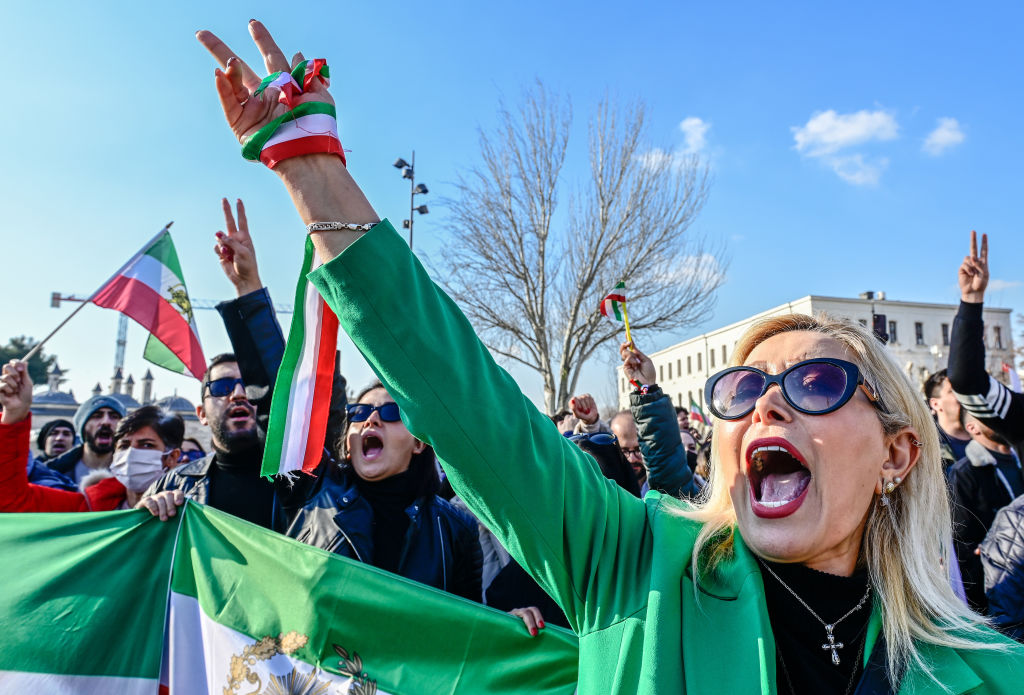
Third, this is indeed a female-led revolution, but the protesters are not solely women. From the beginning, we have lauded the fact that Iranian men and boys have been out there, shoulder to shoulder, protesting alongside Iranian women and girls.
Lastly, it’s likely not an accident that the four men executed to date and the dozens of others who face imminent execution include a karate champion, a bodybuilder, a doctor, a popular rapper, etc. In instances of war and conflict, both international and domestic, there is a history of aggressors targeting strong, skilled men and boys. This is androcide: when one side of a conflict sees its opposing men, fighting or otherwise, as rivals and a threat to their superiority and thus sets out to kill the rivals and neutralize the perceived threat. Frankly, only a country led by weak and insecure brutes treats its own people as the enemy and wantonly subjects them to violence and death.
Is there anything people outside of Iran can do to help? Is there something specific the American government should be doing?
This revolutionary movement is ongoing, and the plea of Iranian protesters is for everyone outside of Iran to be their voice. To that end, one of the most helpful things that people can do is to keep posting about Iran across their social media channels. This is the rare case in which posting about an issue on social media is not “slacktivism,” but rather, proper activism. You can also join protests, speak with friends about what’s going on in Iran, and generally use every opportunity to spread awareness of the Iranian people’s fight for women, life, and freedom.
Revolutions are unpredictable, but the Islamic Republic regime is unlikely to fall quickly. To that end, both the U.S. and the international community need to have short-term and long-term plans. Short-term actions include announcing targeted sanctions on Islamic Republic leaders, appropriately reducing the Islamic Republic’s legitimacy in multilateral institutions like the UN, and increasing civic technology access; long-term actions include mobilizing needed humanitarian aid, emergency medical services, and greater international accountability mechanisms.
One thing that we really haven’t been talking about—but we should—is that as Iranian protesters are being brutalized, there are lives, limbs, eyes, and more being needlessly lost due to a lack of medical care. I believe that international leaders (by “international leaders,” I mean every country in the world, as well as the United Nations, World Health Organization, Red Crescent, Doctors Without Borders, and the like) need to think harder and more innovatively about what aid and support they are providing to Iranian protesters. Getting emergency medical services into Iran will be a challenging task, but it is still an effort that should be made, preferably as noisily as possible. I would really like to see more people calling on the various humanitarian/health organizations to step up efforts to help Iranians who are fighting for freedom.
When Dr. King Talks to Me, This is What He Says
Uncategorized
Reflections on the words you know and the ones you don't.
BY REBECCA CARROLL
January 12, 2023
I grew up in New Hampshire, which was the last state in the country to observe Martin Luther King, Jr. Day as a holiday (kicking and screaming, at that; they held out until literally the year 2000, almost two decades after federal legislation making it a national holiday was passed).
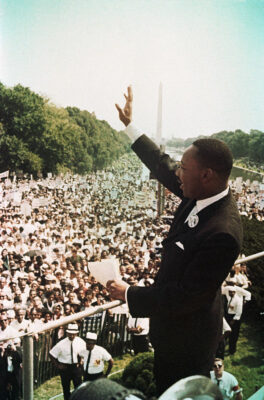
At home, though, my white adoptive parents told me the words and leadership of Martin Luther King, Jr. made them feel encouraged about adopting and raising a Black child. “We believed in his message about people of all races coming together,” my mom liked to say.
To which I responded, on more occasions than I’d like to recount, that first of all, it was a dream. People of all races weren’t exactly unified when King made his “I Have a Dream” speech in 1963—the year Medgar Evers was murdered, the KKK killed four little Black girls at the 16th Street Baptist Church in Birmingham, and tens of thousands of folks marched on Washington for their basic civil rights.
And second of all: He was killed because of that dream.
My parents’ interpretation of King’s message felt willfully naive to me. But it is not uncommon for white liberals then or now to pride themselves on just knowing who he is while conveniently forgetting how radical his message was at the time of his assassination—particularly following his public denouncement of the Vietnam War in a speech given at the Riverside Church in Manhattan. Up to that point in 1967, most Northern liberals felt pretty OK about supporting King’s fight for civil rights on American soil. But when it came to people of all races in other parts of the world? Not so much. (King also committed the cardinal sin of pushing back against American military power, considered unpatriotic then and now.) The media went nuts. In a piece called “Dr. King’s Error,” The New York Times, a notable ally of King’s, called his speech “both wasteful and self-defeating.”
But his words, the famous and less-famous ones, continue to exist and reverberate in the world. It’s odd to miss people you’ve never met (much less public figures or historical icons) but when I reread some of King’s words, I miss him. I miss the extraordinary power and passion of his focus and his love for us in real time. I often wonder if he could have imagined how the things he said amid great struggle and duress would decades later be cut, spliced, removed from their context, and posted on Instagram. I wonder if he could guess that there would be a generation that knows him better for his quotes than for the fact that he helped get a law passed authorizing the federal government to treat me—and people of all races—equally.
If we are going to keep lionizing his quotes, though, then MLK Day (now recognized nationally) is a good time to look at a few of them more closely and reconsider the ways they still hold meaning. Here are a few that resonate with me:
“History will have to record that the greatest tragedy of this period of social transition was not the strident clamor of the bad people, but the appalling silence of the good people.”
The strident clamor of the bad people still be stridently clamoring. (Two words for you: January 6th.) And as we face some of the most vicious attacks on our rights, the “appalling silence of the good people” continues to damage and divide us as a nation. The U.S. Supreme Court eliminated the constitutional right to abortion. There were over 600 mass shootings documented in 2022. Voter suppression is still rampant. And while I am heartened by those who do speak out and protest, most people, even those who consider themselves fair-minded, choose to remain silent. That astonishes me.
“Discrimination is a hellhound that gnaws at Negroes in every waking moment of their lives to remind them that the lie of their inferiority is accepted as truth in the society dominating them.”
Still holds. I don’t think even the most well-intentioned white people understand that America’s default settings—the standards of all that we know and have codified into the canons of literature, beauty, education, moral codes, and societal behavior—is a made-up truth devised to make non-white people, specifically Black people, feel less than across the board.
“I can never be what I ought to be until you are what you ought to be. This is the interrelated structure of reality.”
In other words, your acts of oppression are oppressing us both.
“Make a career of humanity. Commit yourself to the noble struggle for equal rights. You will make a better person of yourself, a greater nation of your country, and a finer world to live in.”
Will it, though? I wrestle with this line of Dr. King’s. I have committed myself to the struggle throughout my entire life and career—and it doesn’t always feel noble. A lot of times, it just feels exhausting. King was not wrong about the struggle making you a better person, but being a better person doesn’t automatically mean the world changes. That’s the throughline—for all of King’s grace, fortitude, and elegant militance, he placed his faith in a universal humanity that did not exist then and does not exist now.
But I suspect King knew that as well. If America could have its own version of humanity, then why couldn’t he have one, too? One that doesn’t demolish the other version, but rather helps to rehabilitate it? As his daughter Bernice King has reminded us in her own tireless efforts at carrying on King’s legacy: “My father literally fought his entire life to ensure the inclusion of all people because he understood that we were intertwined and connected together in humanity.”
I guess that’s ultimately what keeps me in the struggle: a version of humanity that is fueled by compassion and sustained by the truth of our existence. And I will chase down that version until it no longer needs to be imagined. As King himself said, “We must accept finite disappointment, but never lose infinite hope.”
Iran Will Execute More Protestors
|
Top of the evenin’ to ya, Meteor readers, I am in a mildly jovial mood as I write this because this newsletter is our 100th edition. Can you believe it? It feels like just minutes ago we were deconstructing Pam and Tommy and wondering what might happen if Elon really did buy Twitter. Simpler times, no?  In today’s centenary newsletter, we return our attention to Iran, which slipped from headlines while Kevin McCarthy and his drama were sucking up all the air in the room. Plus some other news you might have missed. For the (literal) hundredth time, let’s get into it. With an attitude of gratitude, Shannon Melero  WHAT'S GOING ONExecutions in Iran: As protests continue, day-by-day conditions are worsening for those fighting for freedom. Four men were executed by the state after being arrested at protests, and 12 more have been sentenced to death. Their crimes? “Waging war on God,” or in layman’s terms, going against a theocratic government that runs on willful and violent misinterpretations of religion. At present, the total number of Iranians sentenced to death is believed to be 41 (but could be higher). While most of those sentenced to death have been men, women also continue to suffer under the regime’s crackdowns on protestors, facing arrests and both physical and sexual violence. According to WIRED, the Iranian government is also able to use facial recognition software to identify anyone breaking hijab laws. These protests are no longer focused only on the death of Mahsa Amini and the unequal treatment of women. Several Iranians who spoke to The Washington Post anonymously explained that they are fighting for “cultural and political freedom” for all and against the “economic mismanagement” of the current regime. One man, whose family was priced out of Tehran, told the Post, “I feel rage, rage and a lack of hope. It’s desperation…If we go out to protest, they crack down in the worst and most reprehensible way. We really don’t know what to do. We can’t protest. We can’t improve our situation.” As outsiders, we’re seeing the ingredients come together for a slow-moving, long-lasting, and life-altering revolution: Political unrest, economic distress, and religious contention all crashing up against each other until, eventually, the people become too powerful to contain. But this shift in power won’t happen overnight. As journalist Neda Semnani wrote in a previous newsletter, “We must acknowledge that in order for this revolution to succeed, many brilliant, beautiful, and brave human beings will give up their futures for someone else’s. We must acknowledge their suffering, their fears, and most of all, the lives they won’t get to live. We must also acknowledge the people they leave behind and the pain those who will survive will carry with them. This is what it means to resist and to revolt. It means that one group will sacrifice their plans, their potential, and all their normal mornings so that perhaps, one day soon, the rest of us might revel in freedom.” AND:

  The United States has the shortest paid parental leave policy of any wealthy nation in the world, with a whopping ZERO weeks of guaranteed paid leave for workers. FOLLOW THE METEOR Thank you for reading The Meteor! Got this from a friend? Sign up for your own copy, sent Tuesdays and Thursdays. Ideas? Feedback? Requests? Tell us what you think at [email protected]
|
![]()
Why the Congressional Sh*tshow Matters
|
Hey there, Meteor readers, The first week of January is almost over; how are those resolutions coming along? Yeah. Mine too. Tomorrow, as we all know, is the two-year anniversary of the January 6 insurrection. I can’t remember what I had for breakfast this morning, but I can still remember that day when someone told me there was a riot at the Capitol and I simply responded, “No, there’s not.” A few moments later we were watching it unfold on CNN: thousands of people violently rushing into the Capitol building demanding that Mike Pence and Congress reject the results of the 2020 election. Jan. 6 was a turning point in American history and politics. A group of people had a completely different understanding than most of the country of how democracy should work and they were being goaded on by a sitting President. Alarmingly, not much has changed to ensure something like this can’t happen again. Yes, arrests were made and prison sentences were handed down to rioters—but election deniers still hold positions of power. More than ever ran for office in 2022 (though many lost). Donald Trump, who reveled in the event, still talks about a presidential run despite the January 6 Committee recommending he face criminal charges. We are truly in the Upside Down. In today’s newsletter, we get into this year’s big mess, Kevin McCarthy, the latest on Andrew Tate, and a touching note from one of you. (If you’ve never sent us a message, try doing something new this year!) Wondering how two years went by so fast, Shannon Melero  WHAT'S GOING ONDon’t speak: It’s been a bad week for Representative Kevin McCarthy, who lost ten different rounds of voting in his attempt to become Speaker of the House. The fact that his own party is responsible for making McCarthy a national embarrassment is the kind of true-life comedy Judd Apatow wishes he could write. But beyond the extremely good tweets this event has produced (including this IG post) lies a more serious problem. The 118th Congress can’t be sworn in until a Speaker has been chosen, which means that because of this right-wing nonsense, the country has been running without a functional House all week (although how functional it’ll be when this all gets sorted is a question for another day). So while we’re all enjoying a hearty laugh over this man’s desperation to get some votes (and some pizza), let’s not forget we need this matter to be resolved to get on with the work of governing. As Amanda Marcotte explained in Salon, it’s not really about McCarthy: “It's about the Republican Party's self-conception in its exciting new fascist iteration (which was forged under Donald Trump but doesn't really have much to do with him either).” In order for fascism to flourish, Republicans must, Marcotte writes, “bully” and “ritually purge a once-trusted insider” who’s failed to fall in line with the group. What will the GOP choose? Implosion or compromise? My money’s on the former.  WHEN THE JOKE'S NOT THAT FUNNY BUT YOU KNOW THERE'S ANOTHER VOTE COMING. (IMAGE BY CHIP SOMODEVILLA VIA GETTY IMAGES) More than words: During a televised conference on state-run IRNA news, Ayatollah Ali Khamenei of Iran made a comment about hijab that we’re extremely skeptical about: “Hijab is undoubtedly an inviolable necessity, but this inviolable necessity should not cause those who do not fully observe hijab to be accused of being irreligious or counter-revolutionary,” he said to a room full of women. The comment was an attempt, after four months of protests over the death of Mahsa Amini, to hint at some sort of directional shift or leniency on the government’s treatment of those not observing their interpretation of hijab. But given that the same government has handed down 26 death sentences for those who have been arrested at the protests, it’s not particularly inspiring anyone to believe that change is on the way. It gets worse: Two women have come forward against influencer Andrew Tate claiming they were abused by him in the UK in 2015 and their cases were allegedly mishandled by UK police and Crown Prosecution who failed to bring any formal charges against Tate. (Not only was he not prosecuted, he was on Big Brother UK during the investigation.) According to Vice, Tate was arrested on suspicion of sexual assault and physical abuse and was eventually released while the investigation into the women’s claims took four years to be handed over to CPS. During that time, Tate was allegedly running a “webcam sex business” with his brother. AND:
 OPENING OUR INBOXThis week we got an absolute gem of a letter from newsletter reader Sean who writes: Let me first start by stating that my 24-year-old daughter is amazing!! I want her life to have an equal opportunity for happiness, health, career satisfaction, respect, and choice for her future life decisions. She is the reason I started reading your articles. In fact, she is the reason I’m able to love without boundaries. I believe that these freedoms dictate the ability to truly express love. And I don’t want a world where authentic love is stifled. I want love to abound....I want the most authentic love attainable for me, and all others. This defines a healthy world. Commonality is found across the globe (based on this). I commend your education, to men like me, through thoughtful articles. Sean, we’re so happy that you’ve found your way to us. And aren’t you a lucky guy for having an amazing daughter. Thanks so much for reading!  FOLLOW THE METEOR Thank you for reading The Meteor! Got this from a friend? Sign up for your own copy, sent Tuesdays and Thursdays. Ideas? Feedback? Requests? Tell us what you think at [email protected]
|
![]()
We're Getting In on the In/Out Trend Too
|
Felicitous new year, Meteor readers, Wow, we’re back at it again in 2023. I, for one, have been in a time freeze since the last time we chatted. The Meteor is coming off of a seven-day vacation during which I chose to live my best life—and by that, I mean I reorganized my closet and played several hours of God of War: Ragnarok. (She’s a gam3rgrl.) I hope your end-of-year was just as exciting.  In today’s newsletter, we’re easing ourselves into 2023 with our own version of what’s in and what is absolutely out (*cough* low-rise jeans *cough*). But first, let’s take a look at the news. Typing from the floor of my extremely clean closet, Shannon Melero  WHAT'S GOING ONBirth behind bars: According to the Arizona Republic, Perryville prison induced three incarcerated women before their due dates without their consent. While induction is safe in most cases, doing so before a due date is a decision between a patient and a care provider—and the women told reporters that they were not given the choice to refuse induction, and would have preferred to give birth without it. They’ve also claimed that prison medical providers insisted that the inductions were part of Arizona Department of Corrections policy—most likely as a way to decrease the prison’s liability—rather than a medical necessity, bringing an entirely new and frightening meaning to forced birth. (The ADOC did not comment on the situation, but NaphCare, the medical contractor working with the prison, denied the existence of any such policy.) One of the women, Stephanie Pearson, told the Republic, “They just told me that someone on a different yard a few years ago went into labor in their cell, and had their baby in the cell, and that's why they induce everyone now.” Desiree Romero, who was also induced, said she wasn’t surprised that she wasn’t being given any choices: “I’m quite used to the prison making all these decisions for us because we are still state property.” AND:
 MARTINA PRESENTING THE WOMEN'S SINGLES CHAMPIONSHIP TROPHY AT LAST YEAR'S US OPEN. (IMAGE BY DIEGO SUOTO VIA GETTY IMAGES)
 THE LAST IN/OUT LIST YOU'LL NEED THIS YEAR You know what's always in? Winning free stuff. We're giving away tote bags to the first 10 people to click on the image below just as a thank you for sticking with us into the new year.  FOLLOW THE METEOR Thank you for reading The Meteor! Got this from a friend? Sign up for your own copy, sent Tuesdays and Thursdays. Ideas? Feedback? Requests? Tell us what you think at [email protected]
|
![]()
Your Favorite Meteor Stories of 2022
Happy (almost) New Year, dear Meteor reader,
It’s almost our anniversary—yours and ours. In January, Meteor founding member Jennifer Finney Boylan wrote the first feature essay of the Meteornewsletter—and it’s been a thrilling journey ever since. So much has happened this year, and who better to celebrate with than you?
First, a round of applause to Meteor collective members who had astounding years. There were books: Supreme Court commentator Dahlia Lithwick released her much-anticipated Lady Justice; Amber Tamblyn’s Listening in the Dark taught us to trust our intuition; and Julissa Natzely Arce Raya’s latest, You Sound Like a White Girl, acted like medicine unto the bones.
And there were prizes: Rebecca Carroll snagged three Webbys for her show “Billie Was a Black Woman,” Salamishah Tillet won a Pulitzer for distinguished criticism, Dawn Porter showcased the heroes of Title IX, and our podcast “Because of Anita” got a Gracie. It’s giving…

Meanwhile, in a year that came with some challenges, it meant a lot to us to tell stories that resonated with you on the issues that matter. Projects like the “My Abortion Story” series, the viral Josh and Amanda Zurawski interview, Talia Kantor Lieber’s student investigation into colleges paying (or not paying) for abortion travel, and live events like 22 For ‘22 and Meet the Moment where we got to meet some of you, in the flesh, for the first time.
It was also an emotional year on our podcast “UNDISTRACTED” with some amazing episodes: the most important conversation about RENAISSANCEever, an analysis of the Great Resignation with Elaine Welteroth, and who could forget the touching dialogue between host Brittany Packnett Cunningham and her husband, Reginald, about the birth of their son, who was delivered at just 24 weeks. Some of us are still crying about that one. (It’s me, I’m us.)
Of course, I would be remiss if I didn’t shout out the highlights of my favorite part of The Meteorverse: this newsletter right here, powered by all of you. Thank you, readers, for every open, every click, and every time you’ve forwarded our stories to someone you know. It means the world to us. And if you are so inclined to continue sharing The Meteor with your friends, family, enemies, exes—anyone you want, we don’t judge!—here’s a list of our top 10 newsletters this year as decided by you, the all-powerful arbiters of interesting.
10. Muslims Are Not a Monolith
9. “If they could kill her, they could kill anyone.”
8. Queen Elizabeth’s Complicated Legacy
7. How Our Data Is Used Against Us in the Post-Roe World
6. The Best (and worst) Parts of the KBJ Hearings So Far
5. The Supposed Death of #MeToo
4. When “Feminists” Spout Hate
2. Puerto Rico’s Dimming Future
The entire Meteor team wishes you a gentle and restful new year. We’ll see you here, in your inbox, in 2023. And we’ll keep bringing you the news and stories you want to know about with a full serving of feminist perspective—and a splash of dry wit—to keep things interesting.

For auld lang syne,
Shannon Melero
